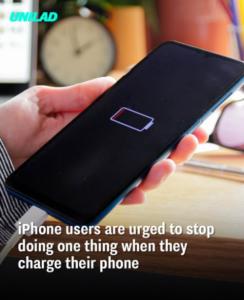iPhone Users Are Urged to Stop Doing One Thing When They Charge Their Phone
Apple’s iPhones have revolutionized the way we interact with technology, but even the most advanced smartphones come with their own set of rules and tips for optimal use. One common practice that many iPhone users engage in could actually be doing more harm than good: charging their phones overnight. While it’s a habit that’s been ingrained in many people’s daily routines, experts are now urging users to reconsider this approach due to potential long-term damage to the phone’s battery.
The Issue with Overnight Charging
When you plug your iPhone in to charge before heading to bed, it’s convenient. It’s a simple routine where you wake up to a fully charged phone, ready for the day ahead. However, what many don’t realize is that this practice may actually shorten the lifespan of the battery over time.
Batteries are chemical devices, and as such, they wear down with repeated use. The lithium-ion batteries used in iPhones have a limited number of charge cycles—typically around 500 full cycles—before they start to degrade and lose their ability to hold a charge. A charge cycle occurs when you drain your battery completely (or close to it) and then recharge it to 100%. This cycle doesn’t happen all at once, so charging your phone halfway through the day also counts as part of that cycle. But when you plug your iPhone in overnight, you’re often charging it well beyond the 100% mark, keeping it plugged in for hours after it’s fully charged.
When your phone reaches 100%, it stops charging, but the battery is constantly maintaining that charge at 100% until it is unplugged. This process generates heat, and heat is one of the biggest enemies of lithium-ion batteries. Prolonged exposure to high temperatures can cause the battery to degrade faster, which means it may not hold a charge as well over time.
The Impact on Battery Health
Overcharging, or keeping your phone plugged in once it reaches 100%, isn’t as damaging as it once was, thanks to the advances in battery management technology. Apple has implemented a feature called “Optimized Battery Charging” in iOS, which helps mitigate the risk of damage by learning your charging patterns and delaying the final charge to 100% until you’re about to wake up. This helps reduce the time your phone spends at full charge. Despite this feature, however, charging overnight still means that your phone is plugged in for several hours past its optimal charging period, potentially putting unnecessary strain on the battery.
If you’ve noticed that your iPhone’s battery seems to drain more quickly or that it doesn’t hold a charge as well as it used to, this could be a result of prolonged overnight charging. Over time, this kind of charging routine can diminish battery capacity, leading to more frequent recharges and a shorter overall battery lifespan.
What You Should Do Instead
To maximize your iPhone’s battery life, experts recommend avoiding overnight charging altogether. Instead, try charging your phone during the day when you’re less likely to leave it plugged in for extended periods of time. Here are some additional tips to help extend your battery’s lifespan:
- Charge When You Need It: Rather than charging your phone to 100% or letting it dip below 20%, try to keep it within the 20-80% range. This is generally considered the sweet spot for lithium-ion batteries, as it reduces stress on the battery and helps it last longer.
- Use a Smart Charging Schedule: If you rely on overnight charging, ensure that “Optimized Battery Charging” is turned on in the settings (Settings > Battery > Battery Health & Charging). This will allow your phone to learn when you typically wake up and manage charging accordingly.
- Unplug Once Charged: If you do charge overnight, try to unplug your phone as soon as it reaches 100%. Some people use smart plugs with timers to automatically cut the power once the phone is fully charged.
- Avoid Excessive Heat: Try not to leave your phone in direct sunlight or in hot environments while charging. If you notice that your phone heats up while charging, unplug it and let it cool down before continuing.
- Enable Low Power Mode: If you’re low on battery and charging isn’t an option right away, turning on Low Power Mode can help extend battery life by reducing power usage and slowing down background processes.
The Takeaway
While charging your iPhone overnight may seem like an easy solution to ensure a full battery in the morning, it’s worth considering the long-term impact it may have on your phone’s battery health. By following a few simple charging habits and leveraging Apple’s built-in battery optimization features, you can help ensure your iPhone’s battery lasts as long as possible. Making small changes in how and when you charge can make a big difference in the longevity and overall performance of your device.
Feel free to let me know if you want any changes!


